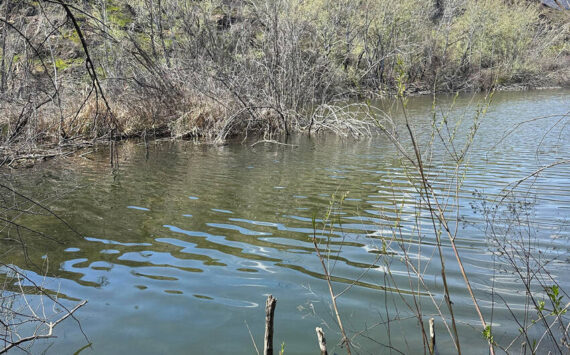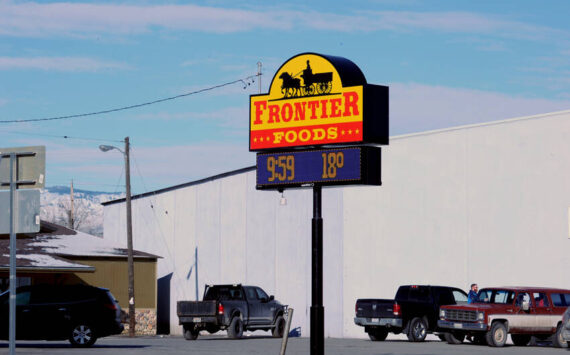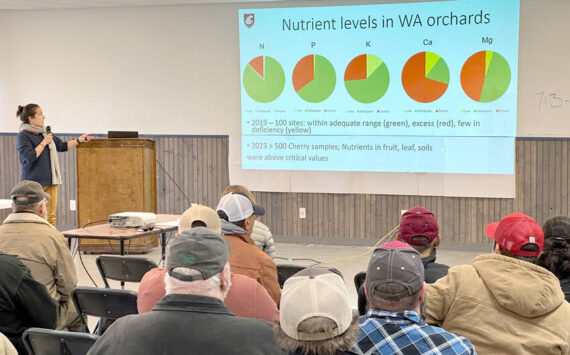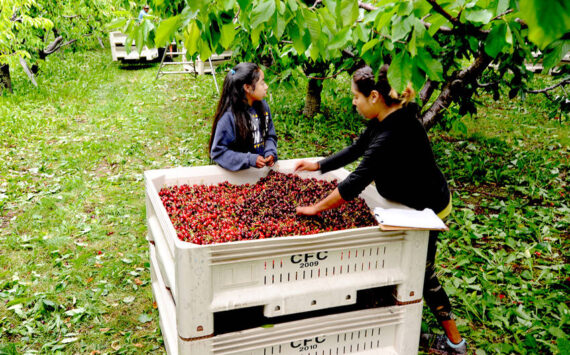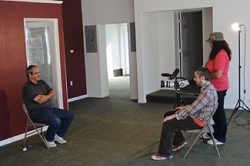
CTTC’s Tim King being filmed by T-Town Productions as part of a documentary on sustainable, green projects being developed in Oroville. King is locating a canola seed crushing plant in Oroville to produce canola oil. Photo by Gary DeVon
OROVILLE – With the delivery of several roller presses to Oroville, it seems that Tim King’s dream of making canola oil is one step closer.
The presses arrived at noon on Wednesday, Oct. 1 at the old Oro HeavyPack Warehouse off 14th Street where they will be housed. The presses, weighing several tons each, were unloaded by a tall crane from a dual-trailered, semi-tractor under the watchful eye of King and those gathered to mark their arrival, including a documentary team from Tacoma-based T-Town Productions.
The crushers and other equipment will be used to set up a pilot plant to crush canola seed into oil to be sold for lubricants and for adding to diesel fuel to create lower emission bio-fuel. The left over meal from the crushing can be used to create high-protein cattle feed as well. For now, most of the seed to be crushed will come from Canadian farmers, but King has approached local farmers about adding canola production to their regular crop rotation.
King, manager of Carbon Technology Transfer Center LLP, said this was just the first of 15 truckloads of equipment that will be housed at in the packing facility owned by Gold Digger Apples, Inc. The company is leasing the building for now and may try and purchase it in the future, according to King’s timeline.
Among the equipment that will be used to crush canola seed into oil will be 1500 metric tons of expellers, with cookers, flakers, electrical switch gear and materials handling equipment, such as drag lines, augers and conveyers.
The next step after the equipment is moved into the building, said King, is to secure additional financing through a loan or investment. He said the company needs a minimum of $600,000, but $1 million would be optimal. As much as $400,000 would be used as a revolving loan to purchase canola seed. CTTC hopes to have the money in place within the next two weeks.
“We really aren’t looking at your typical venture capital types,” said King. “They all want quick, high returns with no risk.”
With $600,000 in capital, the company would purchase new technology crush equipment, an expander and centrifuge within 30 days. From there they could set up a permanent 200-ton a day crush line and make modifications to the building and be operational in three to four months, according to the timeline.
The $400,000 revolving loan would be used to set up contracts from Canadian brokers for delivery of approximately 100 tons of canola a day or two Super B truck loads at $40,000 per day.
A portable crush plant would be set up to crush the 100 tons of seed a day into oil to be sold until enough equity was built up to reinvest in a value-added bio lubricant plant, reads the timeline. The meal left over from the crushing would be sold as cattle feed until equity was built up to reinvest in a value-added feed mix and pelletization plant.
From there the company hopes to replicate the Oroville pilot facility across Eastern Washington and the Pacific Northwest, with additional phases in Spokane, Omak and Douglas County, for total of 12 plants, five in Washington State, within three to five years.
“Oroville is doing something no one else in the country is doing,” said Ryan Skinner of Sustainable Oroville, which is helping to get the word out about projects like the canola crushing plant and a proposed “green” hotel in Oroville on the Web site www.sustainableoroville.com.
“Oroville is going forward with projects like these and without the government getting involved,” Skinner said, adding that the Web site has brought positive attention to Oroville from other industries looking for a forward-thinking community.
Skinner also applauded Roni Holder- Diefenbach, Executive Director of Okanogan Economic Alliance and Chris Branch, Oroville’s director of Community and Economic Development. They, along with Arnie Marchand and Pam Leslie of LM Energy, as well as interested area ranchers were on hand for the arrival of the presses. Some were interviewed and will be part of the documentary being filmed by T-Town Productions to be released at a future date.


